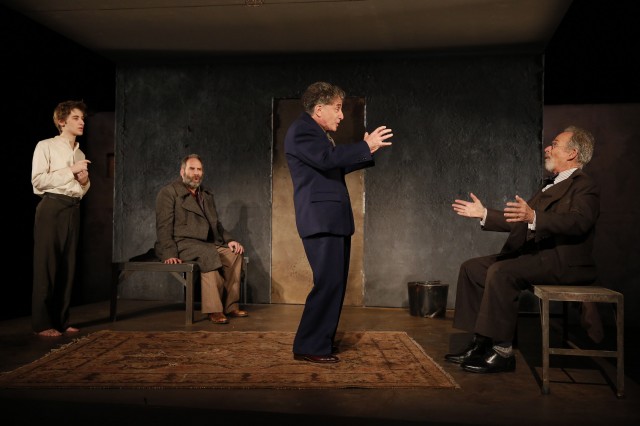
Four imprisoned Yiddishists contemplate their fate in gripping new play by Nathan Englander (photo by Joan Marcus)
Anspacher Theater at the Public Theater
425 Lafayette St. below Astor Pl.
Extended through December 16, $75-$85 ($35 if you use the promotion code “friend”)
212-967-7555
www.publictheater.org
Inspired by actual events, Nathan Englander’s The Twenty-Seventh Man is a powerful, Kafka-esque drama about totalitarianism, freedom of speech, and the impending death of Yiddish literature. Expanded from his short story in the 1999 collection For the Relief of Unbearable Urges, the gripping one-act play is set in 1952 in a dank Soviet cell where Moishe Bretzky (Daniel Oreskes), Yevgeny Zunser (Ron Rifkin), and Vasily Korinsky (Chip Zien) have been imprisoned. Three of the seminal Yiddish writers of their time, Bretzky the poet is a big bear of a man, Zunser the novelist is a quiet, humble thinker, and Korinsky is a brash shill for the state who is certain an error has been made and that Joseph Stalin himself will free him. The three men are soon joined by a mysterious boy named Pinchas Pelovits (Noah Robbins), the twenty-seventh man arrested. Pelovits seems to know a lot about the other writers, but they have no idea who he is or why he is part of this elite, endangered group of Yiddishists. As the four men explore literature, politics, and Jewish identity under Stalin’s brutal regime, Korinsky demands to see the agent in charge (Byron Jennings) despite the guard’s (Happy Anderson) physical threats and own fears. Directed by Public Theater Shakespeare veteran Barry Edelstein, The Twenty-Seventh Man is superbly acted, each man bringing unique qualities to their very different roles. Michael McGarty’s set of hardened steel is claustrophobic despite being open on three sides, as if the possibility of freedom is within the victims’ grasp. Englander’s (The Ministry of Special Cases) skillful, incisive dialogue is a wonder of economy, keeping the audience on the edge of their seats while avoiding becoming pedantic or overly sentimental, proving him to be as adept a playwright as he is a novelist and short story writer.